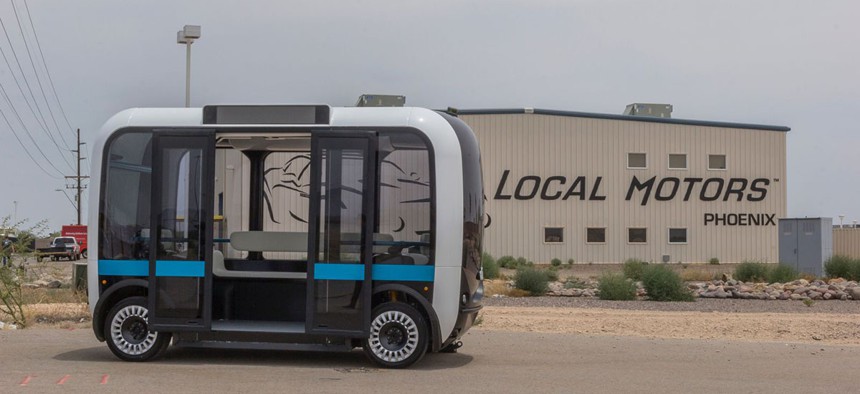Self-Driving Buses Powered by IBM Watson Now Ferrying People Around in the US

Local Motors
And they’re also 3D-printed, of course.
Apparently, creating the world’s first working 3-D-printed car wasn’t enough for Local Motors. The startup yesterday opened a new facility in National Harbor, Maryland, and along with it, a new range of miniature buses that can autonomously take passengers wherever they ask to go. And they’re also 3-D-printed, of course.
Local Motors’ new buses, which look a bit like ski lifts on wheels, are called Olli, and will be puttering around the greater Washington, D.C., area after their maiden voyage yesterday. The electric vehicles, which have a top speed of about 12 mph and a range of roughly 30 miles per charge, use similar technologies to Google’s self-driving cars to see the world as they roll around.
But they also use Watson, IBM’s suite of artificial intelligence software, to understand what’s around them as they move, as well as whatever their human passengers ask of them. Olli has the same speech recognition and language understanding built in that allowed Watson to beat a bunch of smart humans at the quiz show "Jeopardy!" and have a rousing conversation with Bob Dylan. A rider can say, "Take me downtown,” and Olli will obey. They can hold conversation with Olli as they ride to their destination and, according to IBM, they can even ask, like every petulant child ever, “Are we there yet?”

Olli buses are monitored by humans at all times—so even though the buses can react to the world around them considerably faster than a human could in the same situation, humans can still intervene. (Which is great to hear, in case any of them try to escape.)
Local Motors plans to manufacture more Olli buses at its new facility in Maryland, and according to Recode, test out the bus bots in Las Vegas, Nevada, and Miami, Florida, by the end of the year.
“It’s quite possible we will build several hundred by the end of this year,” Local Motors told Recode.
While mainstream self-driving car adoption is likely decades away, driverless technologies may find other ways into our lives sooner. Self-driving trucks are being tested around the world, and are expected to have a massive impact on the U.S. economy, and automated delivery bots are currently being trialled in Washington and London.
In a short video released by Local Motors, in which Olli has a curiously British accent, the company hinted at a future where the very notion of transport is fundamentally changed: Olli could be a mobile gym, a café on wheels, or even a meeting room that drives to its attendees, not the other way around.
Local Motors isn’t the only company rethinking what public transit looks like in the 21st century. A similarly shaped bus called the WEpod started shuttling people short distances in the Netherlands earlier this year.





